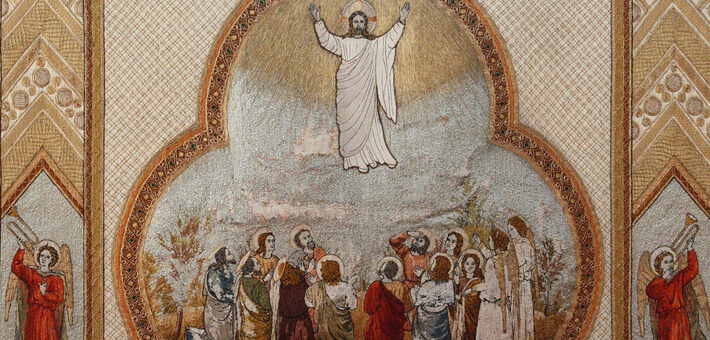Commentary on Luke 24:44-53
Electronic devices die, or at least that is how we describe what happens when their batteries have no power.1
We connect them to chargers for a period of time in order for them to be able to function again. Charging is an ongoing process. However, many of us may not know that there is an optimum period of time that a device should charge in order to maximize the battery’s life expectancy. For a laptop, it is 24 hours and for most smart phones it is a minimum of 3 hours. You cannot simply pull your device from the box and start to use it. If you get a little eager and use it before it has been fully charged, you are negatively impacting it future ability to perform. In other words, you will shorten the life expectancy of your battery if you do not allow the initial charge to be optimal. I think this analogy may be instructive for understanding the impact of Jesus’ ascension on the disciples.
Remembering: Whose report will you believe?
Isaiah 53:1 states: “Who has believed our report? And to whom is the arm of the Lord revealed?” These questions are posed in the context of the description of the suffering servant. These questions seem pertinent for Luke 24. At the beginning of Luke 24, there is an empty tomb.
Two men in dazzling clothes ask the women: “Why do you look for the living among the dead? He is not here, but has risen” (24:5). The women, Joanna, Mary, Mary Magdalene return to the disciples to tell them what they witnessed, but the disciples did not believe them. They did not believe the report of the women. Their eyes were not yet open to the truth of the resurrection.
The women’s witness is associated with an act of remembering. Though remembering is often associated with death, it is at the same time a life-affirming action. To be remembered enables life to be continued in a way. Funerals are replete with remembrances. It is as though we have to look back in order to move ahead. I think it is significant that the gospel writer states: “Then they remembered his words.” After remembering what Jesus had taught them, the women at the tomb realized that he, indeed was not dead.
Even after his death, Jesus continues to teach his disciples. On the way to Emmaus, Peter and Cleopas encounter the risen Christ. After Jesus blesses and breaks the bread “their eyes were opened, and they recognized him; and he vanished.” (23:31). When Jesus appears to them again, he reminds them of the words that he spoke “while I was still with you.” They are instructed to remember. Jesus’ teaching “opens their minds to understand the scriptures.” Remembering can open our eyes and minds. This was all done in preparation for the opening of their hearts in order to receive the Holy Spirit.
Jesus takes the disciples out of Jerusalem to bless them. They are away from the city when Jesus is carried up into the heavens. However, their return to Jerusalem brings this gospel full circle. Jerusalem is a central character in Luke-Acts. In Luke 2:22 Mary and Joseph take Jesus to Jerusalem “to present him to the Lord (as it is written in the law of the Lord, “Every firstborn male shall be designated as holy to the Lord).” In the temple they encountered a man named Simeon who took baby Jesus “in his arms and praised God, saying “Master, now you are dismissing your servant in peace, according to your word; for my eyes have seen your salvation, which you have prepared in the presence of all peoples, a light for revelation to the Gentiles and for glory to your people Israel” (Luke 2:29-32). Here, at the end of Luke, the disciples return to Jerusalem “with great joy” and they, too, go into the temple and praise God for their eyes have seen our salvation.
A season of preparation
Jesus instructs the disciples to stay in the city. Reading Jesus’ instruction to the disciples through our own experiences of sheltering in place sheds new light on the necessity of waiting. Now Jesus has been carried up into the heavens and the disciples are waiting “until you have been clothed with power from on high.” There is no indication in the text that they knew how long they would have to wait. It seems that the Holy Spirit could have descended on them at the same moment that Jesus was leaving, but instead they are sent back to Jerusalem to wait.
Waiting is rarely easy and it can be even more difficult to endure when you do not know when the end will be. The beginning of Acts provides a glimpse into what was happening. The writer describes the group as together and unified, 120 people who spent their time praying and waiting. This time of preparation equipped the disciples to go out and spread the gospel, enabling the church to grow.
While they were waiting, they questioned when would Israel be redeemed? And just as suddenly as Jesus leaves, the Spirit descends. The disciples may not have experienced this waiting time as a time of preparation. Perhaps this is only apparent in hindsight. Yet, this season of waiting seemed necessary. Much like we must wait to fully charge our devices, the disciples likewise had to wait to be clothed with power. If their initial “charge” had not been full, they would not have been able to operate at their optimal levels.
Eastertide is a journey to Pentecost. Forty days after Jesus’ resurrection, he ascends into heaven. During this season we reflect upon his life, death, and resurrection. We remember that though he has gone to heaven, he does not leave us alone. Our eyes, minds, and hearts are once again opened in order to receive the Holy Spirit, our comforter and our guide.
There is no power without a season of preparation, without a period of waiting. May we be empowered to do the work of the Lord as we are reminded, that this promised gift of God’s presence will always be worth the wait.
Notes
- Commentary first published on this site on May 21, 2020.


May 26, 2022